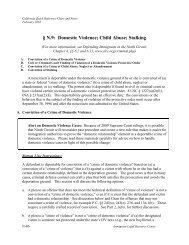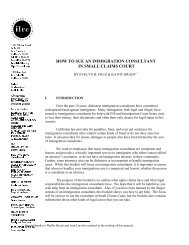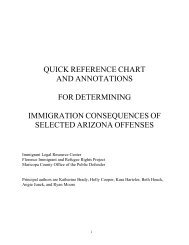Inspiring Leadership in Immigrant Communities - ILRC
Inspiring Leadership in Immigrant Communities - ILRC
Inspiring Leadership in Immigrant Communities - ILRC
- No tags were found...
You also want an ePaper? Increase the reach of your titles
YUMPU automatically turns print PDFs into web optimized ePapers that Google loves.
<strong>Inspir<strong>in</strong>g</strong> <strong>Leadership</strong> <strong>in</strong> <strong>Immigrant</strong> <strong>Communities</strong>January 2003§ 7A.2 Negotiat<strong>in</strong>g: Practical TipsHere are some suggestions to keep <strong>in</strong> m<strong>in</strong>d when negotiat<strong>in</strong>g.Tips for a Successful Negotiation1. Target the right personWhen deal<strong>in</strong>g with bureaucracies, you can save a lot of time if you first f<strong>in</strong>d outexactly who has the power to make the decision that you want. You can waste weekstry<strong>in</strong>g to get through to one person, only to f<strong>in</strong>d out that a person or even a differentbranch of the agency really has the decision-mak<strong>in</strong>g authority.2. If necessary, ask to speak with a supervisor.Example: Marta went to her son’s school to discuss why the school suspendedher son for fight<strong>in</strong>g, but not the other child <strong>in</strong>volved <strong>in</strong> the fight. The vicepr<strong>in</strong>cipal officer says that he did the right th<strong>in</strong>g because it was Marta’s son whostarted the fight. Marta knows that this is wrong because a teacher told her thatthe other child started the fight. Marta tells the vice-pr<strong>in</strong>cipal this, and the vicepr<strong>in</strong>cipal refuses to change his m<strong>in</strong>d. Marta demands to see the vice pr<strong>in</strong>cipal’ssupervisor, the pr<strong>in</strong>cipal of the school. Marta conv<strong>in</strong>ces the pr<strong>in</strong>cipal to <strong>in</strong>terviewthe teacher who witnessed the fight and reconsider the decision.Example: INS is deta<strong>in</strong><strong>in</strong>g asylum applicants from the People's Republicof Ch<strong>in</strong>a without bail for removal proceed<strong>in</strong>gs. A community groupsupport<strong>in</strong>g the applicants arranges a meet<strong>in</strong>g with the District Director ofthe INS to ask him to release the applicants. Before the meet<strong>in</strong>g, the localmember of Congress contacts INS to voice her disapproval of its detentionpolicy.3. Leave a paper trail!It is critical to make a record of everyth<strong>in</strong>g that happens before, dur<strong>in</strong>g, and aftera negotiation session. All negotiators must keep careful notes <strong>in</strong> a file of everyth<strong>in</strong>g thathappens dur<strong>in</strong>g the negotiations. Thus, you must summarize all phone calls and meet<strong>in</strong>gsand keep a copy of all written correspondences <strong>in</strong> a file. If you reach an agreement withthe other side, send them a letter thank<strong>in</strong>g them for com<strong>in</strong>g to an agreement and stat<strong>in</strong>gthe agreement so they know that you are keep<strong>in</strong>g a record.Generally when you write letters, refer specifically to each of the previous timesyou have tried to resolve the problem. This is much more impressive than say<strong>in</strong>g, "Itried to call several times." If many people are hav<strong>in</strong>g the same problem, collectdeclarations from them and consider send<strong>in</strong>g a group letter or arrang<strong>in</strong>g a meet<strong>in</strong>g withthe agency with whom you are try<strong>in</strong>g to negotiate to try to resolve the problemApp.7-A-2
















